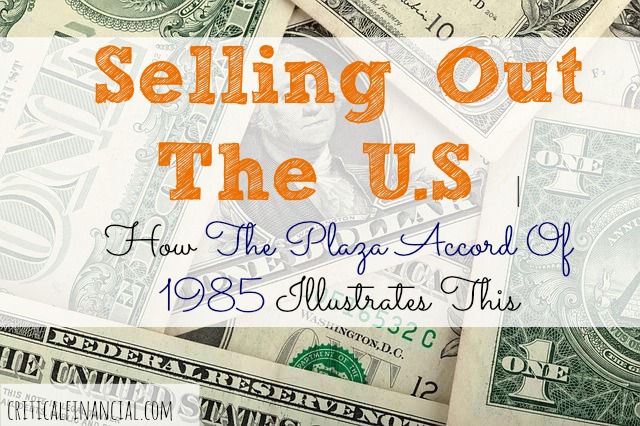
The average consumer has probably never heard of the Plaza Accord, nor is s/he aware of the huge ramifications that it’s had on our lives. Furthermore, even Joe Above-Average Consumer might not be aware of the fierce global debate over whether a similar agreement needs to be struck to regulate global commerce once again.
The Plaza Accord was signed at the Plaza Hotel in New York City on September 22, 1985, by the G-5 nations: West Germany, France, the United States, Japan and the United Kingdom. The agreement forced the U.S. to devalue its currency ( Yes, DEVALUE IT’S CURRENCY!!!) Can you believe it? This was done to ‘help’ to correct both the trade imbalances and negative GDP “growth” of the non-American countries involved.
What the accord did was make the exchange rate of the dollar versus other currencies more indicative of its actual value on the world market. In this instance, the U.S. dollar took a bullet to help the economies of its fellow G-5 members and prevent a string of trade wars that could have threatened the entire global economy. At the same time, the deal enabled the U.S. to immediately trim its trade deficits and bolster its competitiveness in world trade.
The Accords impact to the value of the Yen was significant
The impact of the agreement was swift: the Japanese yen went from 242 yen-per-dollar to 153 in 1986. The German deutsche mark, French franc and British pound also gained value vis-à-vis the dollar. Those gains lubricated the trade streams of many developing nations as well, as their goods instantly became more competitive on the world market. In this case, the rising tide of the yen’s value lifted all of the boats in the world economy.
This historical covenant marked the first time that central bankers agreed to intervene in currency markets, and it represented a choice of global good over individual sovereignty, as all countries agreed to economic adjustments, from tax cuts in Germany to more open markets in Japan. Despite its devalued currency, the U.S. prospered as exports became much more profitable due to the new strength of foreign currencies, making U.S. manufacturers much more competitive.
And so begins the Japanese “lost Decade”…..
In contrast, Japan felt the sting of the Plaza Accord of 1985 in subsequent years as its consumers rushed to the banks to get loans and laid the foundation of the country’s “lost decade” of the ‘90s. As domestic consumption was overly stimulated, both land and stocks skyrocketed to falsely high values. This created an economic bubble that burst in the 1990s, a devastating shock to the Japanese economy from which the country has still not fully recovered.
In recent years there has been a renewed examination of the Plaza Accord and questions over whether a similar arrangement needs to be implemented as China’s economy has grown at a white-hot rate. As in the mid-‘80s, American industries are crying foul due to a questionable valuation of a foreign currency—this time the Chinese yuan–which makes it extremely difficult for Yankee businesses to compete on the world market. The U.S. has a mammoth trade imbalance with China now as it did with Japan in the ‘80s.
Getting China to cooperate and sign a pact similar to the Plaza Accord will prove to be quite difficult, however. China is not a member of the G-5 and has shown a general reluctance to re-value its currency. In addition, China has never had the type of warm relationship with the U.S. and its politicians that Japan did. The U.S. and China have huge differences in opinion over human rights, economic cooperation and harm to the environment, among other sore spots. China has consistently called for a multi-polar world power structure, with the U.S. sharing influence and economic might with other nations. China would be first in line to reap the benefits of such a multi-polar world, of course.
Who is better off China or the US?
This makes the Plaza Accord more historic than even previously known, because the likelihood of a similar agreement is minimal, given the relationships of the principal players abroad. China is not exactly like Japan of the 1980s, but it is largely perceived as the most likely candidate to overtake the U.S. as the world’s #1 economic power. Unlike Japan, however, China does not appear willing to slow its growth for the benefit of the world economy, making a Plaza Accord II extremely unlikely. After it is all said and done, who would be better off anyway, China or the US if a Plaza Accord II were to be constructed? Check out my earlier post on this, here.

